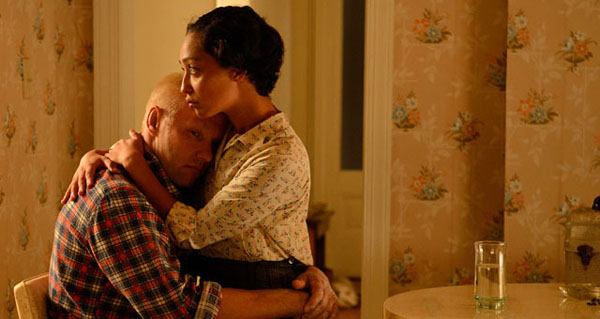
Josh Reviews Loving
Jeff Nichols’ film Loving tells the true story of Richard and Mildred Loving. In the nineteen fifties, Richard, a white man, and Mildred, a black woman, fall in love and decide to get married. They get married in Washington, DC, but their home state of Virginia outlaws interracial marriage. They are arrested twice in Virginia and eventually, to avoid prison, they agree to leave Virginia for twenty-five years, abandoning their families and the lives they had known. Their case eventually winds up before the Supreme Court, and the landmark 1967 decision Loving vs Virginia would invalidate all laws preventing interracial marriage.
This is an important story, and writer/director Jeff Nichols brings it to life with artistry and dignity. (Mr. Nichols has unbelievably written and directed TWO 2016 films. Earlier this year saw the release of the sci-fi story Midnight Special, a film that I have not yet seen but one to which I very much hope to catch up before finalizing my end of the year lists.)
Loving is anchored by the phenomenal performances of its two lead actors. Ruth Negga plays Mildred. I enjoyed her work on Marvel’s Agents of S.H.I.E.L.D. (and apparently she was terrific in the first season of Preacher, which I have not yet seen but hope to), but this performance is leagues beyond what I have seen her do before. With small gestures, Ms. Negga brings Mildred’s warmth and honesty and integrity to life. Joel Edgerton, meanwhile, plays Richard. This is an almost silent performance, as Richard is a man of very few words. And yet, Mr. Edgerton’s work renders dialogue almost irrelevant, as he’s able to bring the audience right into Richard’s mind and heart. What a joy it’s been to watch Mr. Edgerton’s work develop over the past decade. He was wasted (as were much of his fellow cast-members, let’s be honest), in a tiny role as a young Owen Lars in Star Wars Episode II and III. He was solid in Zero Dark Thirty and terrific in leading roles in Black Mass and Exodus: Gods and Kings, two not-great films in which he, nevertheless, shined. Comparing his work here in Loving to his role in Exodus shows Mr. Edgerton’s range, as in Exodus he is all blustery talk while here in Loving he is quiet and internal. The chemistry between Ms. Negga and Mr. Edgerton is wonderful, carrying the film on their shoulders.
Mr. Nichols avoids any Oscar-bait speechifying or other artificial, overly-grand silliness in his film. There are no overly-caricaturized villains and while it is tough to watch at times, the film avoids the unpleasantness that some films focusing on the Civil Rights struggle of this era dive deeply into. For much of its run-time, Loving plays as a quiet character-study of this couple, Richard and Mildred. The film rarely steps back to present the larger picture of the Civil Rights movement in the sixties, allowing a few brief snippets of television footage and a few comments here and there to set the stage, telling the audience everything we need to know and allowing this story — and these two remarkable people — to speak for itself. The film shocked me by avoiding the temptation to show us any of the tense and triumphant Supreme Court showdown — think the end of Amistad — that could have given the film a huge, music-swelling climax. Instead, Mr. Nichols keeps his focus squarely on Richard and Mildred, and for this film that is 100% the right choice. Mildred and Richard are remarkable, and they are heroic. But Mr. Nichols’ film, and Ms. Negga and Mr. Edgerton’s wonderful performances, allow them to remain normal, life-size, regular people. For me, this only magnifies their heroism.
Nick Kroll pops up unexpectedly in a pretty-straight role Bernie Cohen, the young lawyer assigned by the ACLU to take on the Lovings’ case. Mr. Kroll brings a dash of humor into the proceedings that is welcome. Jon Bass (whose face I recognized from brief appearances on Girls and The Newsroom) is also strong as the second lawyer with whom Mr. Cohen pairs up. Marton Csokas (so memorable as Celeborn in the Lord of the Rings films, and also excellent in films such as Kingdom of Heaven, Alice in Wonderland, Noah, The Amazing Spider-Man 2, and Sin City: A Dame to Kill For) plays the sheriff who arrests Richard and Mildred. Mr. Csokas’ sinister glare is put to great use as this racist character, but Mr. Csokas and Mr. Nichols (continuing the theme from my last paragraph) resist the temptation to make the sheriff into a scenery-chewing, moustache-twirling bad-guy. The sheriff’s small, human-sized cruelties are unpleasant enough. I’ll also note the great Michael Shannon (Revolutionary Road, Man of Steel, The Night Before) who appears in a very small role as the Life magazine photographer sent to photograph Richard and Mildred when their case starts to make news. It’s an extremely minor role, but Mr. Shannon makes a full meal out of it.
It’s incredible to consider that it was only a few short decades ago that there were places in this country where interracial marriages were outlawed. On the one hand I feel joy at how far our country has come since the 1950’s and 60’s. On the other hand, I feel sadness at how profoundly relevant these racial issues remain today. This film’s messages of tolerance and understanding and love are more important now than ever. Loving is an important film, and the secret to success is that it avoids the trap of coming off as if it knows it. This is a gorgeous, haunting film, and one that I highly recommend.
